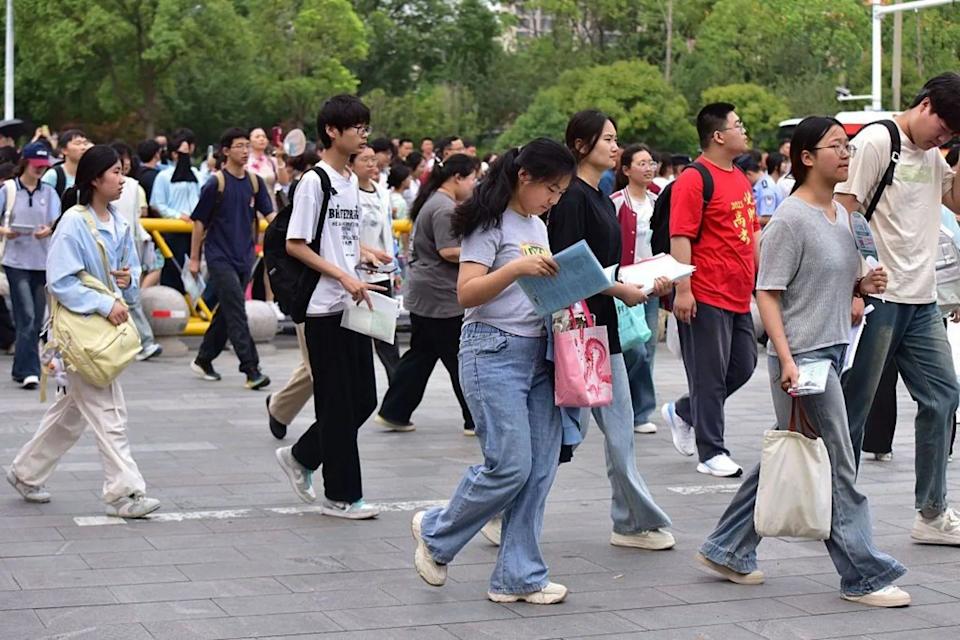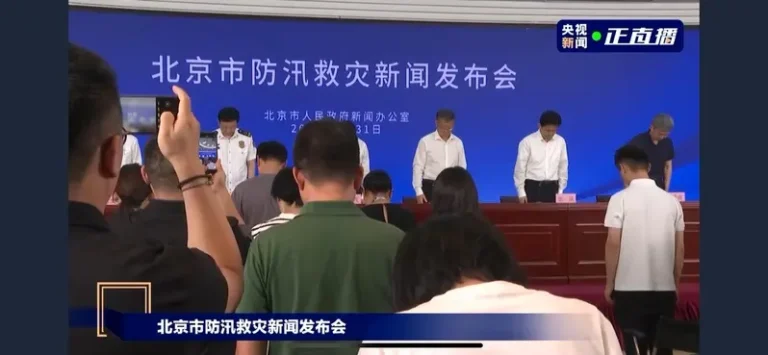
This was supposed to be a peak year for Chinese actress Na Er Na Xi, with roles in two blockbuster films and a much-anticipated TV series.
But in June, the 35-year-old actress’s star was cut short by an online backlash over a controversy about her exam results from more than a decade ago, which ultimately led to an official investigation into her academic records.
The uproar was immediate. Her name was erased from the end credits of the TV series “Lychees in Chang’an,” and major brands began to cut ties with her.
In China, where more and more people are being scrutinized for their privilege, authorities are launching investigations to quell public anger.
The online scandals, which have come to light in recent months, involve two actresses, a Harvard graduate and a doctor at a top Beijing hospital: all young women accused of using family connections to gain illicit benefits.
“There are privileges every year, but this year there are more than ever,” one Weibo user wrote.
Another wrote: “I’d love to see more scandals like this. They’re really eye-opening.”
Research shows that as more young Chinese feel stuck due to rising unemployment and a slowing economy, they are beginning to value connections more than hard work.
For example, Nalnasi was accused of using her mother’s connections, an actress, to get into a prestigious drama school.
The program her mother attended in the 1980s was for ethnic Mongolian students like Nalnasi. But later, old interview clips resurfaced in which Nalnasi said she had not fulfilled a key obligation required by the program – she went to study in Norway after graduation instead of returning to Inner Mongolia to work as planned.
In early June, as millions of Chinese high school graduates prepare for the college entrance examination, the exam that Nalnasi took to enter the drama school in 2008, there was a growing discussion around it.
Internet detectives dug up the lowest score that year—and people suspected that this was the score that Narnassi had scored that year. People even speculated, “Did she get into this drama school because of her mother’s connections?” It was a serious accusation, and the authorities eventually stepped in to clarify that her score was actually much higher. But for the Chinese people, such clarification was far from enough to calm the public anger. The beginning of the scandal Internet scandals are not unique to China, but in a society with strict censorship, they have become a much-needed outlet for people to vent—whether it is to vent anger, doubt, or just express disappointment. Independent media in China is almost non-existent, making the Chinese Internet a hotbed of rumors and conspiracy theories that cannot or are difficult to verify. Netizens are popular for self-investigation to verify allegations and expose wrongdoing. In April this year, two doctors at a top hospital in Beijing were caught up in a national public opinion storm over a suspected extramarital affair. The wife of the male doctor involved wrote to her employer, accusing her husband of covering up for the woman at work because of his private affair. Among the many allegations she laid out, one ultimately cost her husband his job: She accused the male doctor of leaving an anesthetized patient on the operating table for 40 minutes to defend the woman during an argument with a nurse.
The shocking incident simmered as attention turned to the woman involved in the affair. Outraged netizens discovered that she had completed her medical studies in just four years, when the minimum in China’s medical training system is eight.
They accused her of cheating her way into an elite program at Peking Union Medical College, China’s most prestigious medical school, and of plagiarizing her thesis.
The backlash led the National Health Commission to investigate and confirm the allegations, and authorities subsequently revoked the woman’s medical license and degree in hopes of ending the controversy.
Her clinical experience in multiple specialties and her family’s political connections were also questioned. But officials did not respond to the allegations, further raising questions about a cover-up.
“There were loopholes at every step of (the woman’s) promotion, and it’s impossible for the authorities to investigate further,” said a young doctor in Qingdao, who asked not to be named.
She said it was not uncommon for people to use “relationships” to help their children find jobs, but what bothered her was the “deep-rooted unfairness.”
She said it took her 11 years to become a resident physician, and that she and her colleagues had never heard of the career path of the woman in the Union Hospital case: “We were all shocked when we found out. Obviously, it’s not designed for ordinary people like us.”
The scandal is particularly painful in hyper-competitive China, where doctors have to work hard to get residency at top hospitals or simply to keep their existing jobs.
“Why is everything so unfair?” she asked, echoing the frustration that is prevalent in online comments.
“We work tirelessly and treat patients with the care of our grandchildren. Yet, our lives are far worse than this woman’s.”
It was this resentment that also triggered the outrage against Harvard graduate Jiang Yurong in June.
On the same day her commencement speech went viral, a federal judge blocked President Donald Trump’s ban on foreign students from Harvard. She shared the video online, recounting how her difficult childhood, her wanderings, and her hard work gave her everything she has today.
At first, she was praised for her call for unity in a polarized world — even some Chinese commented that they were moved by her words. But her social media posts soon angered Chinese netizens, who began to scrutinize her resume and question her claim that she had “succeeded only through hard work.”
Her critics don’t understand the challenges she faces — they find holes in every story Jiang Yurong tells, and when she argues, they double down on their criticism.
Her words and presence seem to be another reminder of the dwindling opportunities left for most young Chinese.
The post-COVID-19 economic downturn has brought layoffs, pay cuts, and hiring freezes. Millions of graduates are struggling to find work, accepting low-paying jobs or simply dropping out of the race.
One user on Xiaohongshu said that while she was checking out Jiang Yurong’s scandalous posts, the company that had offered her a job rescinded it – because jobs were frozen.
“Sure enough, there are things you don’t have when you are born that you can’t have in the end,” she wrote.
“What do you know?”
The anger is old.
The Chinese government has been scrutinizing celebrities and influencers for excessive displays of wealth in recent times. But some slip through the cracks – like a pair of earrings.
Actress Huang Yangtian was embroiled in the so-called “expensive earrings” scandal after she recently wore a pair of earrings worth more than 2.3 million yuan ($320,000; £237,100).
People began to question how she could afford the earrings, before discovering that her father was a businessman who was a civil servant. They later discovered that he worked for the local government in Ya’an, which was hit by a devastating earthquake in 2008.
The controversy has raised more questions about Huang’s family’s wealth, with suggestions they had profited from earthquake reconstruction funds. Authorities denied the claims and said Huang’s earrings were made of glass and were cheap imitations of a luxury pair.
But not everyone believed them. “What do you know?” one Weibo comment with more than 1,000 likes read. “Did the officials laugh?” asked another user.
While Chinese authorities took the matter very seriously and launched an investigation, their swift response seemed not enough.
“The loss of public trust is not a matter of one or two days. It is the result of investigations that insult our intelligence time and time again, and of unresolved incidents one after another,” wrote one Xiaohongshu note user.
As the Communist Party grapples with growing discontent, popular frustration lingers. The party’s message to young people is that they should “eat bitterness” — a Chinese phrase meaning to endure hardship — for the sake of “national rejuvenation.”
Yet on the Internet, one of the few platforms where Chinese still speak openly, the message seems to ring hollow as people debate the privileges inherent to the “elite” (often shortened to “them”).
“Because of them, we have worked hard for three generations and are still living in misery,” read one of the most-liked comments on Weibo.
Another comment on the Xiaohongshu platform indiscriminately read: “We earn money penny by penny, but they embezzle hundreds of millions at a time—and then they teach us that hard work leads to wealth and that labor is glorious.”






